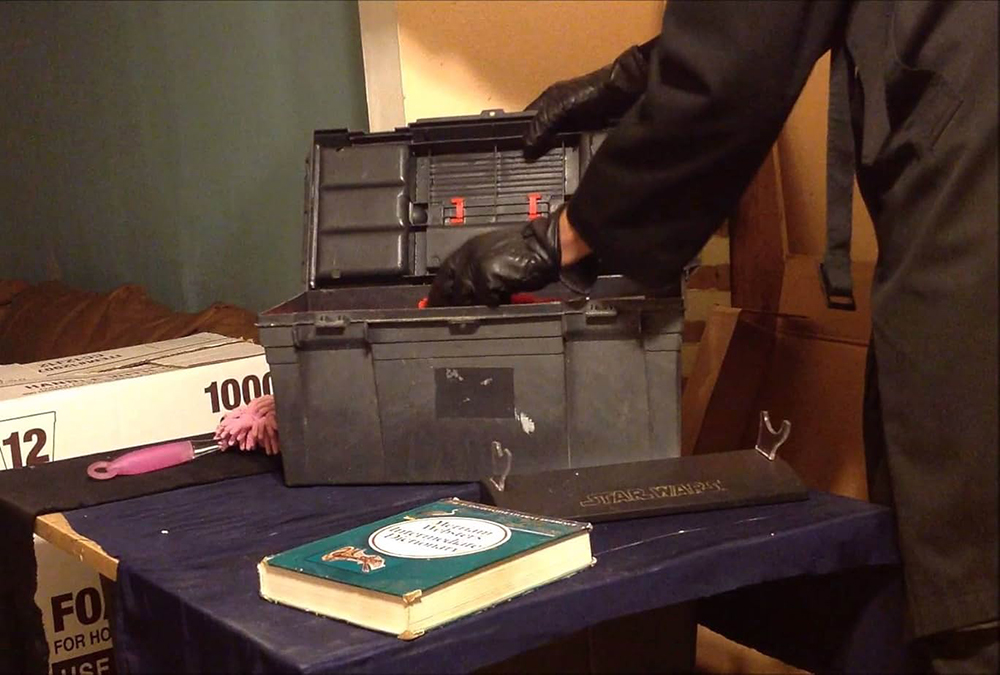“The Toolbox Murders,” from 1978 is always one that hung out on my radar as a slasher to watch. It seemed to fit in with some of the B-movies from that era: “Slumber Party Massacre,” “Maniac,” etc. It appeared on streaming choices weekly, and was even free to watch on Tubi.
Sitting down to finally watch it, however, was not a pleasant experience. The film is not a slasher—not really. It starts that way, before devolving into an exposé on a psychopath who watched “Taxi Driver” one too many times along with his nightly Bible. And along with this, “The Toolbox Murders” is a B-movie in every sense of the word. Its editing is problematic, its scene transitions puzzling, and the dialogue cumbersome and ill-fitting. There is one grisly murder—toward the film’s end—that may be rewarding for gore lovers. That’s of course presupposing you stuck around this far. This is a very rough film to watch, with very little payoff.
Not Really a Slasher
The problem with “The Toolbox Murders”—apart from its patchy pacing and cinematography—is there’s virtually no story. The script was written by a trio of writers, credited to Neva Friedenn, Robert Easter, and Ann Kindberg. I found it puzzling that two of the three writers are female, given the amount of misogyny and female exploitation shown throughout. Without rhyme or reason, a ski-masked man enters apartments in a tenement complex and murders four women with various tools from his toolbox. The deaths themselves are implausible and clumsy. Some women attempt to fight back. However, most just cower, silently (no one screams in this film) until the killer eventually finishes them off. There are several scenes of nudity here—including one prolonged female masturbation scene—but no gore. There’s absolutely nothing scary about the sequences or their lack of build-up.
But apart from this, the film doesn’t know what genre it wants to be. After the initial murders, Director Dennis Donnelly spends a great deal of time on the police investigation that follows. Mostly this involves the lead detective (Tim Donnelly) surmising every motive for the killer except the right one. In fact, when something close to the right one is suggested by one of the victim’s brothers (Nicolas Beauvy), it’s laughed off as nonsensical. Worse still is that most of the detective’s investigation stems from his profiling that the killer must be targeting the women due to their ‘lifestyle.’ He asks if they were known to flirt, what’s their sex life like, etc., as if he’s the spokesperson for the ‘they must have been asking for it’ crowd. Additionally, he clumsily asks one of the victim’s mothers on a date in a bizarre move that seemed forced into the script.
A Deep ’70s Atmosphere

To say some decent things about “The Toolbox Murders,” some good acting finds its way in. I liked the aforementioned Nicholas Beauvy as Joey, and Pamelyn Ferdin, who plays his sister and would-be victim Laurie was good also. The killer—played by Cameron Mitchell—also had his moments. He’s of course completely deranged and off his rocker. But as a consequence of the script, Mitchell has to deliver some lengthy monologues, and you have to give him credit for pulling it off. A family member of the killer’s (played by Wesley Eure) is bizarre, as are most of the other actors in the film. Aneta Corsaut—who plays Joey and Laurie’s mother Joanne—is decent, but hamstrung by scenes and lines that make no sense for her character. The bar she works at is great though: neon beer signs and leather-padded booths exist under old, pull style keg handles. The sets and production design in the film are a high point. This is a ‘70s film and feels like it, a credit to its stylings.
As mentioned above, however, this isn’t a slasher. There are a couple kills towards the film’s first half hour involving handyman tools, but they aren’t nearly as gory nor inventive as slasher cinema is known for. That the film ends with a harrowing (and fairly sinister scene) alluding to the fact that “The Toolbox Murders” are based on a true story in 1967 seems like it’s trying too hard. There was a notorious case in history of similar stylings that took place in 1979, the year after this film’s release, but not in ‘1967.’
A Hard B-movie
“The Toolbox Murders” is just a hard sell. It’s ‘70s through and through—its highlight—but is lacking in most other departments. The film lacks any sense of buildup or atmosphere, and the gory plot implied by the title never manifests. The end has a ‘twist’—I suppose—but it’s as convoluted as much of the rest of the film. You could blame the time period, perhaps; but seeing as John Carpenter released the timeless “Halloween” the same year, even that’s a stretch. “The Toolbox Murders” is bizarre. There are certainly worse films than this, but recommending this as horror or even a mystery/thriller seems irresponsible. It’s a hard B-film. And certainly not the best choice to entertain you on a cold night this Halloween season.